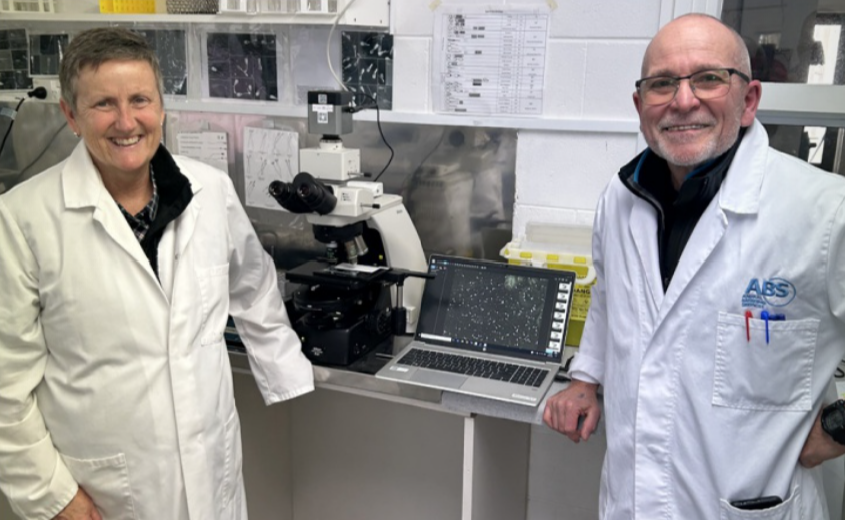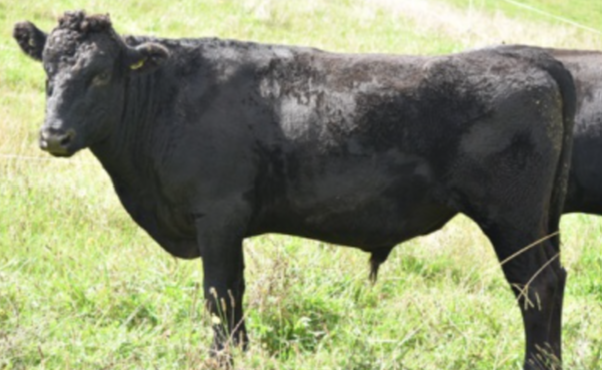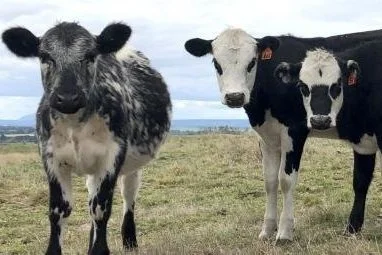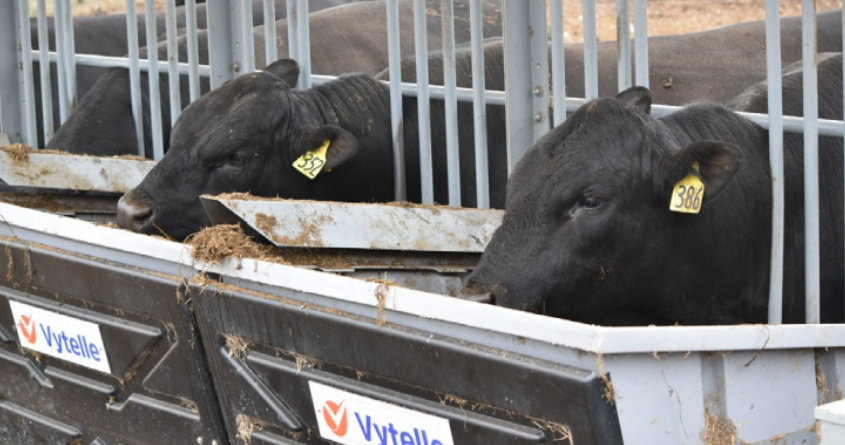
News and Research articles of interest.
-

GENEZ sees huge opportunity for dairy-beef production
Genetics company co-founder Ben Watson sees massive potential in technology helping farmers be more prescriptive with mating lower-genetic-merit dairy cows.
The potential is there with cow collars and wearables allowing for elite beef genetics, perfectly suited for use on dairy cows, to improve profitability for both dairy and beef farmers.
-

Diluter Simmental - The calf marker
GENEZ brings you a world first in Beef Al, perfectly suited to the dairy industry because of its exceptional calf marking qualities and value - the Diluter Simmental.
Kerrah Lucrative L303 brings calving ease, and will mark calves by washing the colour out of his progeny - similar to a Charolais. He carries two copies of the diluter gene, meaning calves will be variations of a washed out straw colour and carry some white on the face.
-

Semen dispatch and pricing
Our semen is collected in two world leading facilities, ABS in the North Island and Xcell breeding services in the South Island. These two facilities have produced the majority of the beef semen used on dairy farms throughout New Zealand over the last 20 years.
Their collection and semen testing systems are world class; they use the latest technology to test and process our beef semen. Industry leading systems and protocols are followed to ensure our semen reaches and exceeds industry standards.
Before the semen leaves the lab, all straw batches are subject to computer analysed semen analysis (CASA) in the post thaw stage, ensuring the highest possible conception rates on farms.
GENEZ beef semen can be dispatched to any technician service from any company throughout New Zealand.
-

Why Wait Wagyu
This programme is targeted at farmers that currently PG their cows that cycle in the week prior to the start of the AB mating period.
A.P.G. Programme brings those cows on heat, ready for mating during the first 1/2 of the AB period, rather than 'wait' until the 3rd week.
The Why Wait Wagyu programme is made possible because of the long gestation bull Number 8 Miche Einstein T46 who has a 292 day gestation compared to a 281 day (11 days shorter) gestation of the standard dairy cow in NZ. We assume farmers will gain 1/2 of this long gestation advantage.
Farmers should save their PG and inseminate with "Why Wait Wagyu" for up to 7 days prior to their normal mating start date, this will not move their "calving date" forward.
This will result in more milk, a compacted calving and higher calf revenue for the farmer. These early calves will grow 50% faster than normal wagyu calves because of Einstein’s extreme growth traits.
-

Progeny testing and genomics
Pushing genetic gain in order to access better and more efficient genetics for growing dairy beef is a key component of what we do at GENEZ.
In 2023 GENEZ collected semen from 19 new 2021 and 2022 born elite beef sires across five breeds. The semen from the yearling bulls was then inseminated into several dairy herds across the Waikato in order to accurately get a gauge on important traits such as calving ease and gestation length. These resulting calves are then tracked in order to gain a measure of performance when compared with already known performance beef sires.
Through early progeny testing of yearling bulls we shorten the generation interval, and make the most of the selection pressure that our elite group of beef breeders are already placing on the best animals in their herds. Genomic testing of beef sires is now significantly increasing the accuracy of these measurements and adding to this selection pressure and shortened generation interval.
Our elite group of beef breeders genomically test their sires and reference them against large data bases of genomic profiles backed by performance measurement. This approach continues to gain momentum
Angus Pro, in combination with Angus Australia have several hundred thousand genotypes in their reference population.
Simmental NZ have recently moved to IGS for their genomic comparisons. IGS contains several million phenotypes and several hundred thousand genotypes.
These comparisons carry millions of data points to benchmark against, increasing the accuracy of BV's and aiding us to find our next group of elite beef sires.
GENOMIC PREDICTIONS FOR DAIRY BEEF:
GENEZ is working with our partner PBBnz to provide cost effective and accurate genomic testing for those commercial beef farmers wishing to predict the performance of their dairy beef cattle.
These tests can also provide an insight into carcass performance to aid premium programme success, along with a prediction on if an animal's carcass may produce yellow fat. Watch this space in the coming months.
-

Dairy meets beef needs
GENEZ supplies premium beef semen for AI, selecting elite traits for dairy cow reproduction. These beef genetics are carefully considered for the dairy industry, but with an eye for market needs.
Ben Watson the co-founder and GM has been working within industry excellence programmes for many years and has a family history in building strong genetic pools in dairy and the beef finisher market. He now has a vision of scaling genetic profiles from dairy into beef [page 53 for the full article]
-
Final report confirms potential of dairy and beef integration
The final report of a five year study into the use of quality beef genetics in a dairy beef supply chain was released today, confirming the potential for dairy farmers to produce high value calves with minimal calving problems using proven beef genetics. CLICK HERE for the full article
-

Dairy Beef Progeny Test results highlight the power of genetics
The latest results in Beef + Lamb New Zealand Genetics’ Dairy Beef Progeny Test once again demonstrate the value of selecting the right beef genetics for use over dairy cows. CLICK HERE for full report
-

Beef, dairy must unite to tackle calf crisis
The dairy and meat industries will need to work more closely if a permanent solution is to be found to ensure calf-rearers have a more viable future. CLICK HERE for full article
-

Te Mania Angus - NZ's first performance recorded Angus stud
GENEZ BRINGS YOU THE ABILITY TO BREED NEW ZEALAND'S LOWEST FOOTPRINT BEEF.
Te Mania have always been at the forefront of technology and innovation for beef genetics in New Zealand. They were the first Angus herd to begin performance recording on BREEDPLAN in 1982 and were early adopters of embryo technology in order to accelerate genetic gain. They now operate one of the few Vytelle SENSE" (formerly Growsafe) feed intake units on their property at Conway flat, located between Kaikoura and Cheviot. The Vytelle system is recording data whenever an animal eats via an EID tag and then
Research shows that 22 grams of methane is produced from every kg of dry matter consumed by ruminant cattle in New Zealand (NZAGRC's Data). Te Mania's feed intake data allows us to select a sire that can produce a kilogram of beef from the least amount of dry matter consumed. GENEZ is selecting sires from Te Mania that are short gestation with excellent growth and calving ease in order to suit the dairy industry. The sires also bring positive change within the beef industry, supporting reduced emissions.
Angus is the world's most intensively selected beef breed and Te Mania are adding another layer of exceptionally valuable data to enhance the world renowned eating quality of their Angus beef.
-

Better breeding worth
New Zealand’s rate of genetic gain in our national dairy herd has lagged behind our competitors over the last 10 years. DairyNZ, through New Zealand Animal Evaluation Limited (NZAEL) wants to improve Breeding Worth to ensure Kiwi dairy farmers remain internationally competitive.
-

Allan Barber reports on work within some key innovative partnerships chasing industry-changing improvements in feed conversion for both the dairy and beef industries
Feed represents over 70% of the cost of beef production which makes feed conversion efficiency an essential component of farm profitability.
-

Genetics key to lifting beef profits, experts say
Breeding quality beef cattle using genetic selection has a huge impact on profitability.


